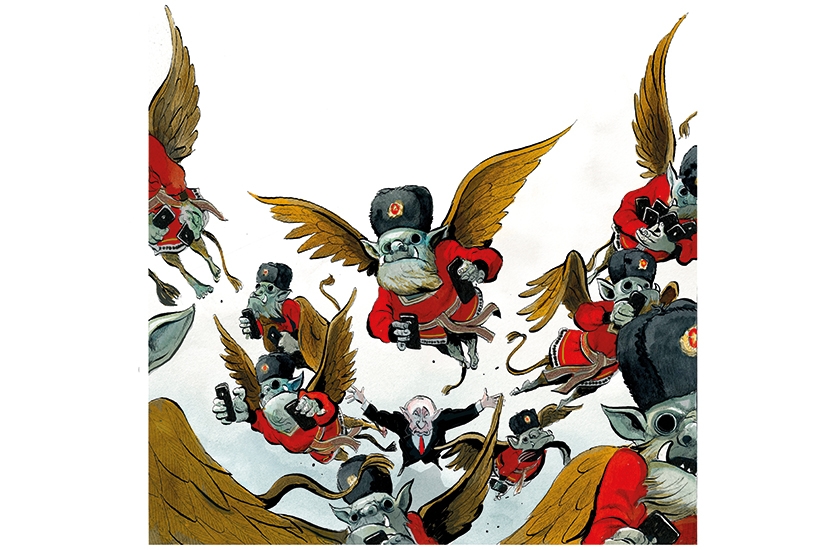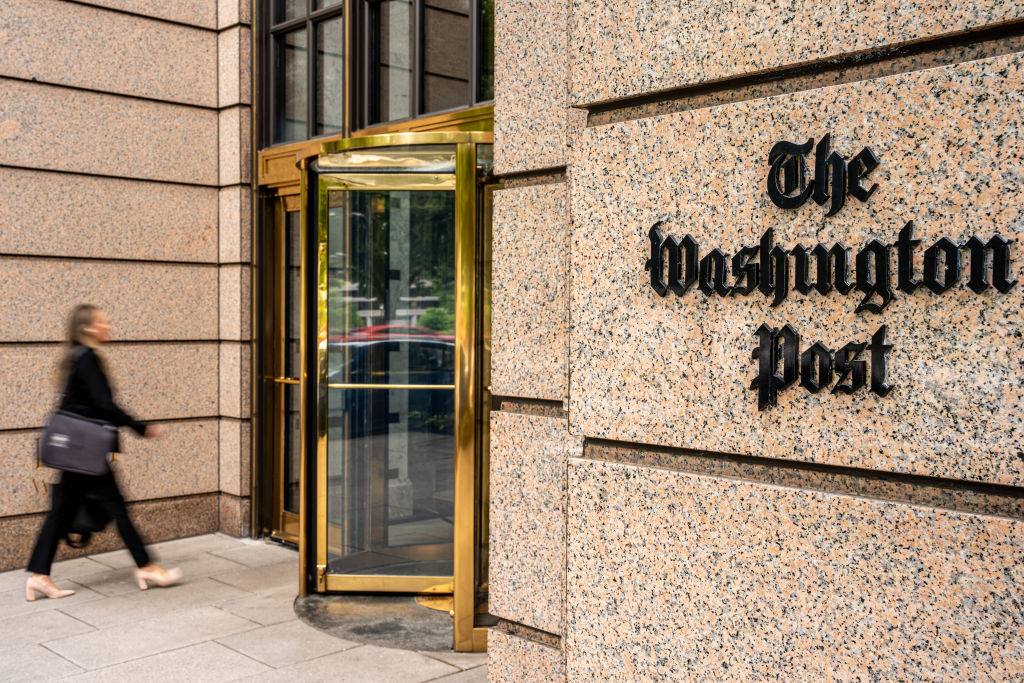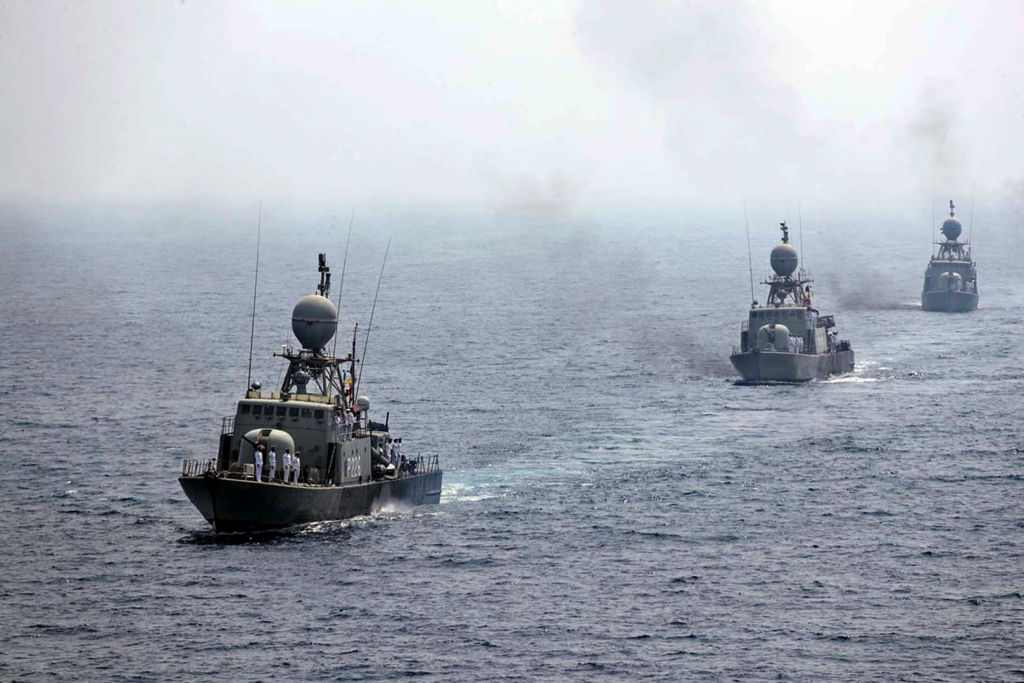There’s only one person who’ll be genuinely pleased with the UK Intelligence and Security Committee’s Russia report, finally revealed on Tuesday, and that’s Vladimir Putin. Russia emerges as an amorphous and formidable enemy — all the more so because the inconclusive and much-redacted report contains next to no substantiated allegations. Instead Russia appears as a phantom, unknowable menace, and this will spawn a thousand conspiracy theories far more corrosive and confusing to our politics than any Moscow-generated Twitter-storm or document leak.
There’s no smoking gun on Brexit. Yet the government-induced delay in publication allows anyone that way inclined to imagine a cover-up. Even the insistence that the state should do more to prevent Russian meddling plays into Putin’s hands. The fear of Russian interference in British elections creates chaos and division — and this, rather than any particular result, is Putin’s real goal.
Russia may be reeling from a collapse in oil prices and one of the highest rates of COVID-19 infection in the world, but Moscow relies on pushing the idea that it’s the West that is really in trouble, racked with violent culture wars and suffering from a profound loss of faith in its own values. The Kremlin’s new party line is: we may have it bad, but their crisis is much worse. And where Putin’s propagandists lead, its trolls and hackers follow.
If recent history is anything to go by, the raging divisions around the Black Lives Matter movement are also a sweet spot for Russian trolls set on fanning the flames of the West’s self-immolation — in the UK, in the EU and especially in America. A Senate Intelligence Committee investigation into the 2016 US presidential election concluded that a Russian fake-news campaign targeted ‘no single group… more than African Americans’. Russian operatives used social media to suppress black voter turnout and stoke division along racial lines. One Facebook page that the group operated, Blacktivist, racked up 11.2 million user engagements and more than 360,000 likes by September 2017 — compared with the 301,000 likes of the verified Black Lives Matter Facebook account.
Russian trolls are equal-opportunity provocateurs. Between 2014 and 2017 the Internet Research Agency, a troll farm based in St Petersburg funded by close Putin ally Yevgeny Prigozhin, ran thousands of Twitter, Facebook, Instagram and YouTube accounts propagating both pro-black and pro-Southern culture themes in the US — as well as pro-Scottish independence and Brexit-related tweets and posts. A detailed 2018 study by the University of Washington found that Russian-controlled Twitter accounts that mentioned the hashtag #BlackLivesMatter were disseminating not only pro-BLM messages but also ironic anti-BLM memes such as ‘What is this world coming to when you can’t aim a gun at some cops without them shooting you? #BlackLivesMatter’. And just in case that wasn’t cynical enough, Russian trolls even sought to discredit BLM by promoting the message that ‘#BlackLivesMatter is an arm of the Russian government’.
Is the Internet Research Agency still up to its old tricks during the latest season of violence and civil strife that has spread from America to the UK? Most certainly, according to seven US officials briefed on the latest intelligence who spoke recently to the New York Times, and warned that Russia’s SVR foreign intelligence agency has stepped up the scale and sophistication of its efforts to fuel discord. ‘We see Russia is willing to conduct more brazen and disruptive influence operations because of how it perceives its conflict with the West,’ David Porter, a top agent in the FBI’s Foreign Influence Task Force, told an election security conference in Washington in February. ‘To put it simply… Russia wants to watch us tear ourselves apart.’
While Facebook and Twitter have become more vigilant about fake accounts, the Russians have also become much better at covering their tracks. After technical details of how fake accounts were spotted emerged during the Congressional investigations, trolls now take care to remove traceable watermarks from their photographs and avoid overtly racist language that gets flagged up by automated systems. Rather than use public pages to spread messages as widely as possible, as in 2016, Russian operatives are — according to the officials who briefed the New York Times — using private Facebook groups, posts on the online message board 4chan and closed chat rooms that are more difficult to monitor. And in a sinister echo of the micro-polling strategies developed by Cambridge Analytica, these messages and groups are tightly targeted on swing voters in swing states.
It’s no surprise that Russia is so good at influence operations in the West given how long it’s been doing them. In the 1920s and 1930s the brilliant Moscow-backed German Communist agitator and networker Willi Münzenberg set up and channelled money to dozens of front organizations, from the League against Imperialism to Workers International Relief, in order to draw thousands of liberal-minded people into supporting good causes secretly funded by the Communist International. Münzenberg called them his ‘innocents’ clubs’. These arms-length organisations had much wider influence than overtly Soviet propaganda organs such L’Humanité or the Daily Worker— just as today’s fake accounts have more influence than the conspiracy-theory spewing Sputnik news agency and the RT (formerly Russia Today) news channel, where it was recently claimed that BLM was a front organization funded by George Soros.
In 1927, well before Europe had become the cultural suburb of the US that it is today, Münzenberg’s network whipped up global protests against the execution of a pair of American anarchists, Nicola Sacco and Bartolomeo Vanzetti, convicted for double murder during a robbery. Protests in support of Sacco and Vanzetti were held in every major city in North America and Europe, as well as in Tokyo, Sydney, Melbourne, São Paulo, Rio de Janeiro, Buenos Aires, Montevideo, Johannesburg, Auckland and even by the pearl divers of Dubai. After the pair eventually went to the electric chair, just after midnight on August 23, 1927, angry rioters destroyed property in Paris, London and other European cities.
The Soviets covertly channelled funds to the Campaign for Nuclear Disarmament and to the National Union of Mineworkers during the 1984 strike. And though FBI director J. Edgar Hoover’s suspicions that Martin Luther King was receiving Russian funds were unfounded, Soviet propagandists used American racism to discredit Washington’s claim to moral leadership during the Cold War. Whenever the USSR was criticized for its human rights abuses, the standard official rebuttal ‘and you lynch Negroes’ was so proverbial that it became shorthand for Soviet whataboutism.
[special_offer]
Today, Russian propagandists no longer have to recruit useful idiots to further their cause. They can simply speak directly to millions through social media. And their task is easier than for earlier generations of influencers, because instead of spreading the message of communism, the modern Russian trolls’ aim is a simple reversal of St Francis of Assisi’s prayer: to bring discord in place of harmony, error instead of truth, and despair where there is hope.
But what is most chilling of all is that perhaps for the first time since the Great Depression, Russia’s latest divisive interference comes in a period when not only the US’s leadership of the free world, but also its faith in itself, are starting to waver. The hostile takeover of the once-moderate Republican party by Trumpian nationalists on the right and the destruction of classical liberalism by the zealotry of political correctness on the left makes America more vulnerable than ever to the kind of toxic nihilism put out by the Kremlin.
Brexit and an ongoing crisis in confidence in the EU across the continent are also music to the Kremlin’s ears. Any kind of discord in the West reinforces Putin’s fundamental message to his own people and to the world that democracy is a weakness, not a strength. Vladimir Lenin, quoting Nikolai Chernyshevsky, wrote ‘the worse, the better’ of the collapsing Tsarist regime. The same is true for Putin. The more divided the West is by its own culture wars, the better his own rule looks in comparison. Putin, presiding over a corrupt and ailing economy that is just one fifteenth the size of America’s, cannot hope to destroy what the KGB used to call the main adversary. But Russia can help — and certainly is helping — America and its allies to destroy themselves.
This article was originally published in The Spectator’s UK magazine. Subscribe to the US edition here.

























